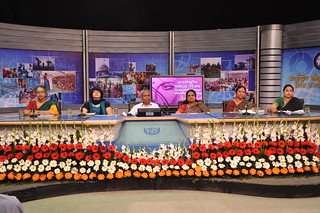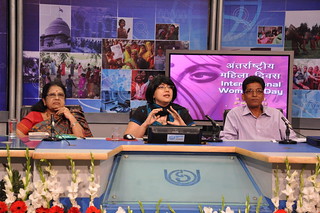 |
|
Sakshi VP Ms. Jaya Tandon spoke on "Value-Based Education" as a solution to social issues including gender-based crimes on an IGNOU Panel on "Gender and Contemporary Society" telecast live on Doordarshan for International Women's Day. Photos |
Established in 1985 by an Act of Parliament with a budget of Rs. 20 Bn, Indira Gandhi National Open University (IGNOU) is India's (and the world's) largest University, with 3.5 Million students in India and 40 other countries, 21 schools, 59 regional centres, 2600 study centres and 52 overseas centres. It is run by the Central Government and besides being a centre of academic excellence, it is also an epicentre of research into social issues and actively spreads awareness about key social issues and their solutions.
On the occasion of International Women's Day, IGNOU organized an expert panel on "Gender and Contemporary Society" to be telecast live on Doordarshan, India's national broadcaster. The topic was chosen in context of recent events - the "Nirbhaya" case - which brought an outpouring of protest across the nation and brought gender-based issues to the forefront of the national consciousness.
As an indication of the importance of the subject under discussion, the Vice-Chancellor of IGNOU himself opened the event and felicitated the panelists which included Sakshi Vice-President Ms. Jaya Tandon, who has long experience in development especially Education and children's and women's issues, and is connected to the development world in both India and the US.
Ms. Tandon spoke on the topic of "Value-Based Education" as a solution to social issues in general and especially the global problem of gender-based crimes and issues. Her address evoked thunderous claps and a number of questions by the audience about how they could learn more and become part of creating this wave of change.
Precis:
The Need for Value-Based Education
-
Global Problem: Ms. Tandon touched on the global nature of gender-based social issues and crimes, recounting cases in the news of crime against women e.g. the Steuebenville case in the US, the Canadian Steubenville case, the crisis in African nations and of course the Nirbhaya Case in India.
-
Silver Lining in the Nirbhaya Cloud: She extracted a ray of hope from the "Nirbhaya Case" in India pointing to the mass protests which followed. She said it was a unique event where people cutting across regions, religions, cultures, socio-economic lines, had taken to the streets in a national outcry.
-
The Invisible Boy Child: Ms. Tandon contrasted the men who participated in the protests with those who had perpetrated the horrific crime on Nov 24, 2012 and asked the audience to think about what the difference could be. In answer, she quoted ex-Chief Justice of India, Hon'ble Altamas Kabir who had called the children growing up on the street without families "lost children" and stated that if they were not brought back into the mainstream, they would grow up to commit dastardly acts like the Nirbhaya incident.
-
The Need for not only Education but Value-Based Education: Ms. Tandon emphasized that though the first step was to bring these "lost boys" into the fold of family, society and the formal education system, however this was not enough. If this was enough, she said, then we would not see consistent cases of gender-based crimes and social issues in the so-called educated strata of society across the world from sexual harassment at the workplace to date rape at colleges to domestic violence in the upper stratas.
She further pointed to the disturbing trends in the educated youth of our country - where it was becoming "normal" for boys to objectify women and adopt baser instincts (portrayed in Bollywood item songs which are meant at best for entertainment) as their core values and where girls were buying into advertising for consumer goods which equated their self-worth with fairness, looks and popularity index.
Ms. Tandon stated that the fault lay with us and our formal education system where pupils were taught Science, Biology, History but not about Values like right and wrong, integrity, courage, compassion, what constitutes self-worth and respect for women and the vulnerable, the elderly etc.
Value-Based Education
 |
|
Sakshi VP Ms. Jaya Tandon spoke on "Value-Based Education" as a solution to social issues including gender-based crimes on an IGNOU Panel on "Gender and Contemporary Society" telecast live on Doordarshan for International Women's Day. Photos |
-
What is Value-Based Education (VBE): Ms. Tandon stated that VBE is not about what to wear, what to say etc but it is about helping children develop their faculty of doing the right thing - and this instinct and judgement is something more intangible that comes from a deeper place inside, and is best summarized by the word "Conscience".
-
Components of Value-based Education: Ms. Tandon talked about the various components of Value-Based Education in detail including Self-Empowerment and Morals and Ethics. Ms. Tandon said being Self-empowered i.e. self-aware, with a developed personality and socio-economically empowered, enables a person to develop a true sense of self-worth. And then on this strong edifice, one can build strong values like Unity in Diversity, Inner beauty over outer beauty, courage, respect for women, compassion for the vulnerable, elderly, environment, animals etc which together comprise "Morals and Ethics".
-
How to Teach Value-Based Education: Ms. Tandon said any learning to be truly imbibed must be interactive and engaging. In this sense, as a best practice, she pointed to the Panchtantra and Hitopdesha where stories conveyed complex ideas like value systems easily and engagingly. For example, something as seemingly small as the fact that the characters in the stories spanned the spectrum of religions, cultures, socio-economic strata, skin colours and even included animals and birds, was actually a very big subliminal learning for the children because it unconsciously made them tolerant of differences, to be inclusive and co-exist peacefully with different races and religions and the envinroment.
​Value-based Education re Perception of Women
Ms. Tandon pointed out that our culture has historically regarded women as a Life Giver and Enricher of Life and has accepted her in a variety of roles spanning Laxmi (prosperity) / Durga (power) / Saraswati (learning) / Sita (wife/mother) / Radha (lover). In modern times, celebrated women included Shri Vijaylaxmi Pandit (freedom fighter), Gayatri Devi (Chipko Aandolan), Sushmita Sen (Miss World) etc.
Ms. Tandon stated that Value-Based Education, through cultural, historical and modern stories and examples such as these, conveyed this idea of a women's all-round capability which automatically inspired respect for women in the pupils's minds and also helped them unconsciously learn that a woman is "allowed" to be who she wants to be whether a mother or a chief executive. Further, VBE by inspiring the celebration of festivals like Raksha Bandhan further inculcated a compassionate and respectful attitude towards the opposite gender.

|
|
"Value Based Education in Context of Gender and Contemporary Society" -Presentation slide showing essential values and relating them to Attitude towards Women. Photos |
Lastly, said Ms. Tandon, a Value-based Education inculcates values broadly and beyond just those based on gender, and teaches children that they are responsible for their own actions. So putting this in context of women's safety, children grow up understanding that what a woman wears and whether her dress is right or wrong, does not justify any demeaning act on their part. Even if the dress is "wrong:", it does not give them the right to commit a sin.
Who is a Value-based Education Teacher?
Ms. Tandon closed her talk by pointing out we have 1 Billion+ Value-Based Education Teachers in India since every one of us has the potential and opportunity to be one.
We can ensure we give our children a value-based education and by doing the right thing ourselves, we can set them an example. Ms. Tandon quoted an Urdu couplet - "सारी दà¥à¤¨à¤¿à¤¯à¤¾ नज़र आती है सितमगर जैसी, बात करते हैं मगर लोग पयमà¥à¤¬à¤° जैसे" (The world continues to be full of terrible deeds while people talk like holy men.).
She urged the audience to have the courage to take action instead of just talking. For example, the next time they encountered a woman being eve-teased / a street child / elderly person living on the road / hurt animal, she urged them to not walk on but to stop and help the girl, dial an elderly care home, enter the child in school, take the animal to the vet etc.
"We don't stop to help because we are shy, we don't want to stand out and we don't know what to do and we don't want to look foolish by making a few attempts that fail before we find the right solution to the problem, but you will be surprised, when you start living your values, no one will laugh, instead they will be inspired with the courage to start living theirs too. And this is Value-Based Education."